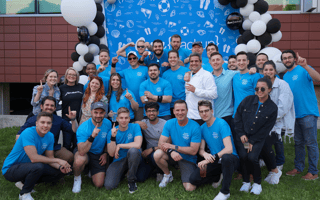Before leaving the company in 2019, Adrian Kunzle logged considerable time at Salesforce in product leadership roles, learning the platform “inside out” over the course of almost eight years. But his subsequent move to OwnBackup — which focuses on providing SaaS data backup, protection and recovery services for Salesforce users (and in the near future, other SaaS clouds), kept him well within the orbit of the software titan.
“I joined OwnBackup to change people’s views of what data protection looks like — from this idea that you back up in case of an emergency to the idea that you back up because your data drifts and gets corrupted through accidents and other things over time,” Kunzle said.
The Englewood Cliffs, N.J.-based company has grown considerably in the last few years, with customers now tallying nearly 4,000 — a dramatic increase since Kunzle came aboard in 2019. However, that success brings with it careful considerations of how to meet client needs at a bigger scale. Specifically, Kunzle — who said that prior senior-level roles at both Salesforce and JPMorgan Chase taught him “how to build great teams” — stressed the need to negotiate customer input with internal focus.

“With an increase in customers, we get an increase in ideas from them as to what they want to see in the product. It’s a great problem to have, but it really tests the product managers,” Kunzle said. “If you’re not good at knowing when to say no, you can get overwhelmed. It tests the team’s ability to stick to a vision.”
And with fresh funding at their disposal, that vision seems poised to expand: In January, the company scored a $167.5 million Series D. Perhaps relatedly, Kunzle said that OwnBackup is preparing to “pilot” its inaugural ecosystem outside of Salesforce.
Nevertheless, Kunzle suggested that demand for OwnBackup’s services is still “kind of emerging,” with many companies yet to fully understand the importance of having turnkey data recovery options.
“We still have a lot of customers who think they've got it covered, and they haven't,” Kunzle said.
Below, Built In NYC connected with Kunzle to learn how the organization aims to equip customers with the proper tools for their SaaS data, and how he aims to assemble the strong teams needed to do so.
You mentioned joining OwnBackup to drive home the idea that data backup is not just for emergencies. Can you tell us more about that?
Kunzle: When we ask CIOs and infrastructure teams, “How often do you have to do a recovery event?” it’s firmly rooted in some big catastrophic thing, because recovery takes time in the file system and database world.
If you don’t spot your corruption fast enough, it comes with collateral damage. When you roll back, you have to roll back linearly. In that rollback, you will lose all the normal good work that was done in the system previously. As an IT professional, you end up having to decide: Is that data corruption more significantly impactful, and worth it given that I’m going to lose a day’s worth of data and everybody’s going to have to re-input stuff?
In today’s digitally transformed, always-on world, you can't afford to take 11 hours of downtime. You can’t afford to take the collateral damage. Our focus is not really on the backing up piece; our focus is on the recovery piece. We’ve built a suite of tools that allows you to compare two points in time in history and extract exactly what changed and work through that change to find what caused the issue. It may well have been a system admin updating something incorrectly or an integration job incorrectly updating 10,000 records. We give you these tools to find the bits of change that you didn’t want to have happen and restore them, and you can do this all while the system is still running.
I joined to change people’s views of what data protection looks like.”
How does having a data recovery platform like OwnBackup change client behavior?
Kunzle: Our customers recover data much more frequently because the process is simple and takes anything from a few minutes to a few hours. Data corruption is a silent event for most, until the user calls in and says, “I’m sure I had this opportunity in the system, why can’t I find it?” It can go unnoticed for days.
Businesses are increasingly reliant on data to make good decisions on a day-to-day basis. We call it data protection, but we’re really trying to move it more into the category of long-term data curation and management. Our tools keep users’ data fresh, vibrant and accurate on a long-term basis.
As a leader, what does it take to build a great team?
Kunzle: It’s a cliche, but one of my rules is to always hire better than you are. I look for people who want autonomy, think strategically but act tactically, know how to get things done, and question everything in a curious way. I like hiring people who don’t think that their role is the only space they should be thinking in. I consider my job day-to-day as a roadblock remover. I’m trying to enable everybody on my team to do the best work they can do.
We still have a lot of customers who think they've got it covered, and they haven't.”
How do you keep your team excited and help them determine what to focus on?
Kunzle: We’ve adopted quite a good tool that helps us collect and look at all their ideas. That helps us take a customer-centric view, and not just listen to who is the loudest sales engineer speaking about something. Their input is valuable, but they bring their own biases to the table. The rest of it is having a good, open process. The key relationship is with engineering. I watch those relationships very carefully to make sure the product leader and the engineering leader are really working hand-in-hand.
The big trick is to help people avoid getting overwhelmed by the set of tasks before them and really say, “These are the top two things you need to get done, then let’s move on to the next most important one,” versus doing 30 things poorly.
A Times-Ten Mentality
What do you think is the most exciting piece in terms of working at OwnBackup?
Kunzle: The culture here is amazing. We take our work seriously, but not ourselves. Also, we’ve got a great set of customers. We’re continuing to build out how we engage with those customers who have so much feedback and so many great ideas. From a product management perspective, it’s a really fun role. There's so much opportunity to help customers protect their data and leverage what is increasingly becoming the most valuable asset aside from their people.





